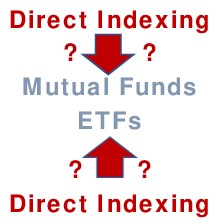The June 8th CFA Boston session – Direct Indexing: Existential Threat to ETF’s & Mutual Funds or Just Another Niche Technology Platform? – asks a question with industry-wide implications. A similar question was asked not that many years ago as ETFs emerged as competition to Mutual Funds. This time around, there’s a substantial sustainable investing component to the story.
 Direct indexing uses software to create a customized portfolio of assets which can be managed for tax efficiency. The portfolio can replicate an index or implement a specific strategy. In either case the combination of tax efficiency and low cost is powerful and potentially very disruptive.
Direct indexing uses software to create a customized portfolio of assets which can be managed for tax efficiency. The portfolio can replicate an index or implement a specific strategy. In either case the combination of tax efficiency and low cost is powerful and potentially very disruptive.
It has been been noted that the huge growth in sustainable investing is a key factor in the growing interest in direct indexing. Direct indexing is seen as an opportunity to capture more of these investors by offering more granular customization of the ESG components of interest to them.
For the sustainable investing community, direct indexing may offer a way to address a growing concern that the proliferation of ESG-branded products includes many poorly-defined offerings with misleading, simplistic labels. While this is often attributed to intentional greenwashing, there is much more at work. Larger drivers include limited ESG skills and depth of commitment required to effectively assess complex and nuanced ESG issues, and the desire to create a few simple and easily marketed offerings.
Planet Tracker, a non-profit think tank created to help investors analyze the risk of market failure related to environmental limits, has just published Indexing: Prepare for Sustainability-Driven Disruption. This paper looks at the potential impacts of sustainable investing interest on indexing generally as well as the specific possibilities for direct indexing. It is relatively short (13 pages), quite readable and makes a thought-provoking background piece for the June 8th session.
